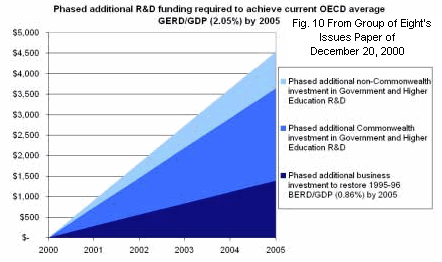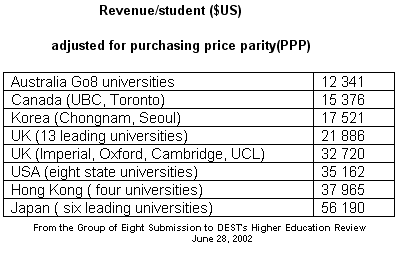For well over two years the Australian Labor Party and the Australian Democrats have decried the Coalition government's emasculation of Australia's university system. The 440 page report Universities in Crisis was published by the Senate Employment, Workplace, Small Business and Education Reference Committee in September 2001after receiving 362 submissions and listening to fourteen days of testimony. It summarised the position of opposition Senators in the first of 39 recommendations:
The Committee recommends that the government end the funding crisis in higher education by adopting designated Commonwealth programs involving significant expansion in public investment in the higher education system over a ten year period.
[See The Back Row for an overall view of the committee's work]
However, there were no specific funding recommendations with the singular exception of recommendation 1 in the Australian Democrats minority report "that at minimum, $500 million additional funds is committed to university operating grants in 2002, as part of a 20% increase over 3 years to take account of unfunded changes in cost structures since 1996. That this 3 year initial re-investment be the basis for a 10 year commitment that is a more realistic basis for public investment in higher education."
What in effect has been the government's
reply,
Australia's Universities: Backing Australia's Future, has been extraordinarily
inept and incompetent, bordering on black humour. If we look at the reaction of
the
Australian Vice-Chancellors' Committee![]()
It's worth revisiting a 29 page Issues Paper published by The Group of Eight on December 20, 2000, Research and Innovation: Australia's Future in which it says categorically:
 In summary the additional investment required over five years (2001-02 to 2005-06) is $4.2 billion from business, $6.75 billion from the Commonwealth and $2.7 billion from other non-Commonwealth sources. This increase in R&D investment could be phased in so that, for example, the Commonwealth contribution would start at $450 million in 2001-02 and rise to $2.25 billion in 2005-06. |
The government's response has been to
allocate $2.9 billion in
Backing Australia's Ability![]() over 5 years from 2001 and what it now calculates to be an additional $1.5
billion from 2004 to 2007 for universities. That said, the National Tertiary
Education Union has critically disputed the government's figure, calculating
that the amount of "genuine new funding" will be only 51% of that -- $753
million.
over 5 years from 2001 and what it now calculates to be an additional $1.5
billion from 2004 to 2007 for universities. That said, the National Tertiary
Education Union has critically disputed the government's figure, calculating
that the amount of "genuine new funding" will be only 51% of that -- $753
million.
Using ABS figures together with the recent assessment by the Australian Vice-Chancellors Committee, we've shown that had the Coalition government maintained its contribution to universities at a percentage of GDP equal to that current when it assumed power, an additional $8.2 billion would have been available between 1996/97 through 2003/04 for university funding.
That figure of $6.75 billion that the Go8 determined should be the Commonwealth's contribution between "2001-02 to 2005-06" for research and development is if anything, conservative. The government's response - determinedly feeble.
Meanwhile, what has the opposition been doing with regard to promulgating policies to bring Australia's universities to top competitive standard or research and development in general? The short answer is next to nothing. Leaving aside the distractions placed before the Australian public by the Coalition prior to the last federal election in coupling the outrage of September 11, 2001 with perceived dangers posed by asylum seekers assaulting our shores, the Labor Party's "Knowledge Nation" was notable for it's lack of specific commitments both in funding and direction, and neither the Australian Democrats nor the Greens put forth policies.
To date that hasn't changed.
One of the excuses political parties in opposition give for being dilatory in developing and costing policies is that they don't have the resources available compared with those holding government, and secondly they would increase their vulnerability to government counterattack by publicising policies too soon prior to an election. Such explanations mightn't be upsides with the primary school pupil claiming, "the dog ate my homework," but they are suggestive of rationalisation rather than illumination, and indicate political parties lacking strength of purpose, leadership or both.
It's instructive that it is the NTEU who has cogently questioned the figures put out in the government's Australia's Universities: Backing Australia's Future not any of the opposition political parties. The NTEU is hardly a cashed up think tank.
One of the keystones for Australia's future is its university system. If those political parties now in opposition have neither the fortitude nor the application to develop and proclaim policies to reverse the decay spreading through our universities, and have neither the will nor the wit to make the matter a dominant issue for Australia's voters, the nation has a serious -- potentially culturally and economically cancerous -- problem.
Alex Reisner
The Funneled Web
